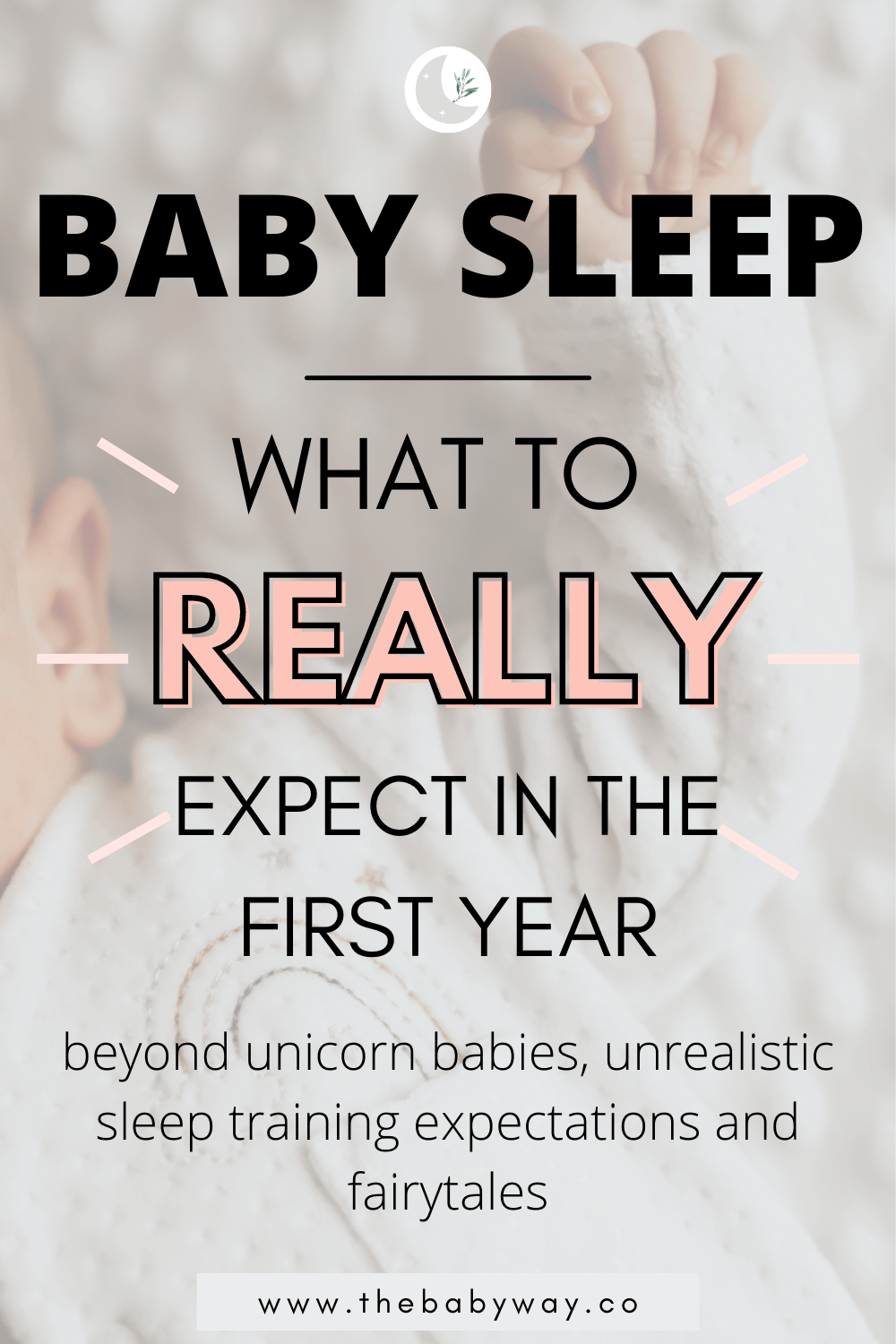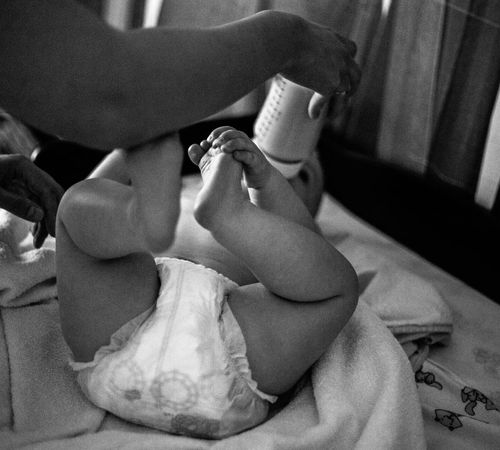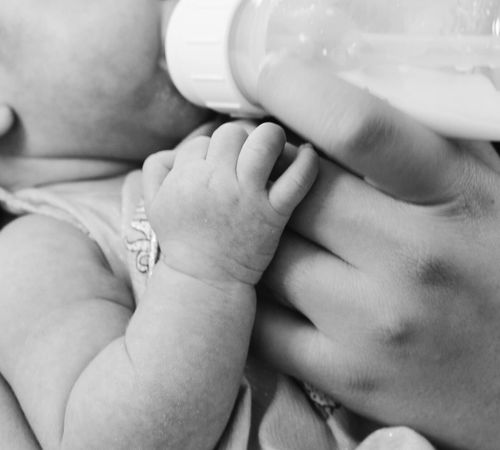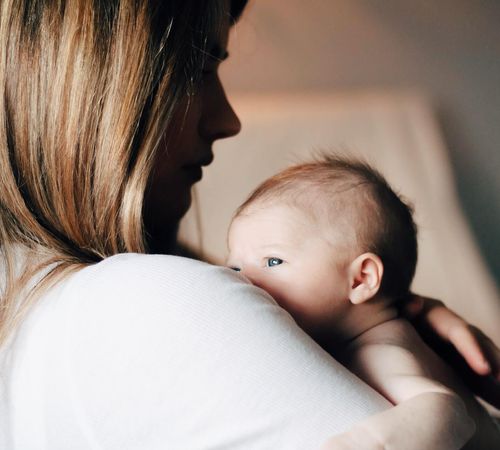Here is what you can really expect from baby sleep in the first year, beyond all those unrealistic sleep training expectations and unicorn babies.
Before you become a parent, you think about a lot. You think about baby names, about the perfect nursery, about birth. You think about the beautiful family pictures you are going to take. But you are probably not thinking much about baby sleep. I mean, yes, we all expected our sleep to change, right? But then your baby is here, and suddenly they do some bizarre stuff you definitely never thought of. They wake after a 15-minute nap, they don't want to be put down when sleeping, and they want to feed at night. Like. A. Lot.
Now you are here because you are worried that there is something wrong with your little one. Maybe you are even wondering if you are doing something wrong. You just keep asking yourself if what your baby is doing can really be normal.
So with all those sleepless nights and restless days, you turn to all-mighty google searching for so much needed answers. But unfortunately, there is a lot of information that will not actually ease your anxiety but increase it.
Babies that sleep 12 hours every night. Babies that don't feed at night anymore at 6 months. Babies that settle completely by themselves as you place them into the crib.
Do you know these babies? Because I don't.
They have a great name, though. They call them unicorn babies. Because they are very, very rare. Just like real unicorns.
Before I start to dig into the subject of baby sleep a little bit deeper, I want to ease your anxiety. So grab your phone, open your gallery and look at a picture of your little cutie pie sleeping. I'm pretty sure you have a few. Don't they look just perfect the way they sleep, so at peace?
And there is your answer: Your baby is sleeping perfectly.
So now, let's get real. Let's find out what you can really expect from your baby during their first year of life beyond unicorns babies and unrealistic expectations marketed to us.
Note: This blog article's only intention is to show you what normal baby sleep actually looks like. I am not saying that you cannot do anything about your baby's sleeping behavior to improve it. I just want you to realize that what you are experiencing with your little one is most likely very normal.
0-2 MONTHS
Your newborn baby's sleep is all over the place. They cannot yet distinguish between day and night and sleep whenever they want. Some babies might sleep all day and are up often at night. Some babies' sleep is distributed evenly throughout 24 hours. There are no real sleep patterns. While newborn babies and young infants (up to 4 weeks) can nap for an hour or more in one stretch, many babies start to have short naps, aka 'cat naps' after a month or so. Contact naps where your baby only sleeps in your arms or on you are also very common (make sure to implement safe sleep practices). Babies will also often wake up once they are put down. This is all normal behavior. Your baby simply wants to be with you all the time, even when sleeping. Bedtime is usually quite late, between 9-10 PM. Your baby will wake every one to three hours for feeds.
Normal baby sleep behavior
- number of naps: 4-6
- total sleep: 16-18 hours
- nighttime sleep: 10-14 hours
- number of night wakings: 4-6
- cat naps
- prefers contact naps, wakes when put down
- inconsistent nap times
- Moro reflex wakes them
- baby's sleep gets easily disrupted by reflux or a gassy tummy
2-3 MONTHS
Your baby slowly develops a more regular sleep pattern and ditches the typical newborn sleep. Their circadian rhythm is starting to develop, meaning they will sleep less during the day and more at night. They now have about 4 naps, one morning nap, one lunch nap, and two afternoon naps. You will notice that your baby is now able to stay awake longer (approx. 45-60 minutes) between naps and becomes more aware of their surroundings. A sleep pattern is now more noticeable. You might also start with a very loose sleep schedule. Bedtime will become earlier but might still be around 8-9 PM. Your baby will still need your help to fall asleep and wake every 2-3 hours.
Normal baby sleep behavior
- number of naps: 3-4
- total sleep: 15-17 hours
- nighttime sleep: 10-13 hours
- number of night wakings: 4-5
- cat napping
- prefers contact naps, wakes when put down
- can still experience a lot of discomfort from gassiness and reflux
3-4 MONTHS
At this age, many babies hit the 4-month sleep regression. This is the time when parents notice the most drastic change in their baby’s sleep. Your baby wakes more often at night or starts cat napping. The regression is linked to the permanent change of their sleep cycle. They will now start to adapt to the sleep cycle of an adult. But why does that contribute to more night wakings or short naps? Rem sleep will be replaced with more light sleep, making them more sensitive to outside disruptions. Inbetween sleep cycles, they will often fully wake and have trouble settling back to sleep. It will take some time until they figure out to connect sleep cycles. It is normal that your baby will still need your help to fall asleep or go back to sleep if they wake. You can now start to get your baby more used to the crib by practicing putting them down once they fall asleep. You can also wait until they are in deep sleep and transfer them then. This way, they will slowly get used to their own sleeping space. You can also start to introduce other healthy sleep habits, such as a regular bedtime routine.
Normal baby sleep behavior
- number of naps: 3-4
- total sleep: 14-16 hours
- nighttime sleep: 10-12 hours
- number of night wakings: 2-4
- cat napping
- prefers contact naps, wakes when put down
5-7 MONTHS
At around 6 months, many babies start with solids. While it is a widespread belief that babies on solids do not need any feeds at night anymore, many don't consider that solids are actually lower in calories than milk. So your baby's primary nutritional income still comes from milk, also at night. Some babies will have more consolidated sleep at night, making them sleep for up to 6 hours. Most babies, however, will still wake every 3-4 hours. Transfers to the crib after your baby has fallen asleep might work better now. Cat napping is still common at this age.
Normal baby sleep behavior
- number of naps: 3
- total sleep: 13-16 hours
- nighttime sleep: 10-12 hours
- number of night wakings: 2-4
- cat napping
8-10 MONTHS
At 8 months, some babies experience the 8-month sleep regression. Unlike the 4-month sleep regression, this one comes with several physical and cognitive milestones. Your baby becomes increasingly mobile, and that will also affect their sleep. Babies are masters when it comes to perfecting skills. They will practice anywhere and anytime. They don't really care if they are supposed to sleep. So even before falling asleep and during wakings, they will use their time wisely to practice, practice, practice.
At 8-9 months, many babies start to dissolve the cat napping sleep problem on their own. They will drop their last daytime nap, the afternoon nap, and the wake window before bedtime becomes the longest of the day. Many babies will also learn to put back the pacifier into their mouth on their own. They can experience their first separation anxiety and demand your presence more during bedtime and night wakings.
Normal baby sleep behavior
- number of naps: 2-3
- total sleep: 13-15 hours
- nighttime sleep: 10-12 hours
- number of night wakings: 1-3
- cries instantly when wakes up (separation anxiety)
- might prefer one parent over another (mainly the one that provides the food)
10 - 12 MONTHS
Your baby now becomes very interested in the world around them and is less 'clingy'. Moving them into their own sleep space or room can work really well. Daytime sleep will decrease, and your baby is probably having one shorter and one longer nap. Because of their increasing mobility and interest in new activities, they might need a long time to settle for sleep. A longer bedtime routine can help them calm down from the day. Some babies will already sleep for a longer stretch at night or only require one nighttime feeding, while others might still wake for up to 3 feedings. Both sleep behaviors are normal.
Normal baby sleep behavior
- number of naps: 2
- total sleep: 13-14 hours
- nighttime sleep: 10-12 hours
- number of night wakings: 0-3
What to take away
When we think about baby sleep, we need to remind ourselves that their sleep needs differ significantly from ours. And even between babies, they vary depending on their age and temperament. While some babies settle more easily to sleep, most babies will need more help. Yes, some babies sleep several hours in a row, but this is not the case for most babies. Babies that settle entirely by themselves or sleep through the whole night at a very young age were probably sleep trained.
Night wakings, short naps, the need to be close to you all serve a purpose and derive from biological nature. From an evolutionary point of view, your baby is not meant to sleep alone or without any interruptions.
The arousal response of your baby is a protective measure to prevent threatening health situations such as the sudden infant death syndrome (SIDS) or threats from the outside world.
And besides all that, your baby is going through major development during their first year of life. Leaps, new milestones, sleep regressions are only a few events that can disrupt your little one's sleeping behavior.
It is unfortunate that new parents are often exposed to so many unrealistic expectations about their baby and that normal behavior is advertised as sleep problems. Instead of obsessing on how a baby is sleeping ("is she sleeping through the night yet?"), we should offer more information on why babies sleep the way they do. Knowledge about biologically normal baby sleep behavior will not only teach new parents what their baby needs sleep-wise, but it will help relieve the pressure of a perfectly sleeping baby. Research has even shown that understanding normal baby sleep behavior can help parents cope and decrease their stress.
Over time you will learn what is normal for your baby. You will learn what their bedtime routine will have to look like. You will learn when they are getting up in the morning. You will learn what sleeping arrangement they prefer. You will learn how they and you want to sleep. And that will be your family's normal.









